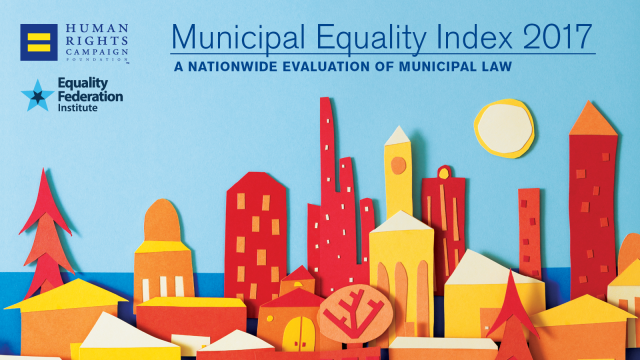HRC’s Municipal Equality Index Works to Make Communities LGBTQ-Inclusive

Post submitted by Collen Kutney, HRC State & Municipal Program Senior Manager
Municipalities across the country are using HRC’s Municipal Equality Index (MEI) as a roadmap to make their communities more inclusive of the LGBTQ people who live, work and travel there.
I had the opportunity to meet recently with the Human Rights Commission of Arlington County, Virginia to discuss how the county can achieve a perfect 100-point score in the 2018 MEI. In 2017, it received a laudable score of 93. Arlington County and Alexandria were the highest-scoring Virginia communities in last year’s MEI, each earning more than 85 points — despite being located in a state without LGBTQ-inclusive statewide non-discrimination laws.
The 2017 MEI, released last October, rated 506 cities across the country on their LGBTQ-inclusive laws, policies and services. The MEI scorecard assesses cities in five categories: non-discrimination laws, the municipality as an employer, municipal services, law enforcement and the city leadership’s public position on LGBTQ equality.
Scoring criteria for the MEI will undergo significant changes in 2018. For the first time, points will be deducted if religious exemptions in non-discrimination protections specifically target the LGBTQ community. More emphasis will be placed on city employee nondiscrimination protections. Two new criteria—committing to all-gender single-occupancy facilities and protecting youth from conversion therapy—will be added as bonus points.
Other changes that will be incorporated into the 2018 MEI:
- The “Inclusive Workplace” and “Enforcement of the Non-Discrimination Ordinance by the Human Rights Commission” categories will be moved from bonus to standard points.
- Domestic partner benefits for city employees will be added back into the MEI scorecard for same- and different-sex couples.
- Anti-bullying policies in school districts has been removed from the MEI scorecard and replaced with a youth bullying prevention policy for city programs and services.
- Finally, cities that push back against restrictive state laws will receive 3 points, rather than 4, for their efforts.
In total, the MEI will reflect 100 standard points and 22 bonus points.
Cities that don’t fall within the MEI’s city selection criteria are welcome to complete the self-submit process. Cities are also encouraged to email [email protected] to learn more about the MEI scorecard and how to improve their score ahead of the 2018 publication release.
You Might Like
